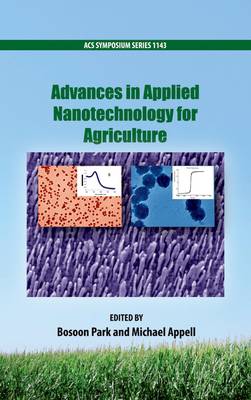
- Afhalen na 1 uur in een winkel met voorraad
- Gratis thuislevering in België vanaf € 30
- Ruim aanbod met 7 miljoen producten
- Afhalen na 1 uur in een winkel met voorraad
- Gratis thuislevering in België vanaf € 30
- Ruim aanbod met 7 miljoen producten
Zoeken
Advances in Applied Nanotechnology for Agriculture
€ 227,45
+ 454 punten
Omschrijving
Agricultural products influence most aspects of life, including food and feed, feedstocks for bio-based products, and everyday materials, such as fuels, textiles, and furniture. Advances in technology are necessary to address the future global needs from agriculture. Nanotechnology is a promising field focused on the unique chemical properties of materials with a dimension of 1-100 nm. Nanotechnology has the potential to revolutionize agricultural and food systems with various applications including food safety, quality, product traceability, better nutrient delivery systems, enhancing packaging performance, and improving agricultural and food processing. This volume of the ACS Symposium Series focuses on the unique challenges of applying nanotechnology to benefit the agriculture sector and the food industry. This book is based on a series of nanotechnology-related symposia sponsored by the Division of Agricultural and Food Chemistry at spring ACS national meetings between 2009
and 2013. During this period tremendous progress was made on practical applications of nano-based technologies to address agricultural problems, including those in the areas of food safety, development of new value-added biomaterials, and nutraceutical/flavor delivery. This book initiated from the interest of symposium speakers to share their work with wider audiences. Fourteen chapters were selected and written for this special issue. The chapters were developed independently and are arranged according to topic. The authors are from a wide range of disciplines and include food scientists, chemists, engineers, biologists, medical researchers, and physicists. The goal of this book is to provide the perspectives of scientists working with nanotechnology to address agricultural problems. The research presented within this book was conducted in proper laboratory environments meeting facility, local, and national safety standards.
and 2013. During this period tremendous progress was made on practical applications of nano-based technologies to address agricultural problems, including those in the areas of food safety, development of new value-added biomaterials, and nutraceutical/flavor delivery. This book initiated from the interest of symposium speakers to share their work with wider audiences. Fourteen chapters were selected and written for this special issue. The chapters were developed independently and are arranged according to topic. The authors are from a wide range of disciplines and include food scientists, chemists, engineers, biologists, medical researchers, and physicists. The goal of this book is to provide the perspectives of scientists working with nanotechnology to address agricultural problems. The research presented within this book was conducted in proper laboratory environments meeting facility, local, and national safety standards.
Specificaties
Betrokkenen
- Uitgeverij:
Inhoud
- Aantal bladzijden:
- 272
- Taal:
- Engels
- Reeks:
- Reeksnummer:
- nr. 1143
Eigenschappen
- Productcode (EAN):
- 9780841228023
- Verschijningsdatum:
- 1/04/2014
- Uitvoering:
- Hardcover
- Formaat:
- Genaaid
- Afmetingen:
- 231 mm x 157 mm
- Gewicht:
- 498 g

Alleen bij Standaard Boekhandel
+ 454 punten op je klantenkaart van Standaard Boekhandel
Beoordelingen
We publiceren alleen reviews die voldoen aan de voorwaarden voor reviews. Bekijk onze voorwaarden voor reviews.










